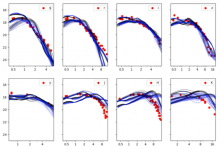
Abstract
Detailed radiative transfer simulations of kilonovae are difficult to apply directly to observations; they only sparsely cover simulation parameters, such as the mass, velocity, morphology, and composition of the ejecta. On the other hand, semianalytic models for kilonovae can be evaluated continuously over model parameters, but neglect important physical details which are not incorporated in the simulations, thus introducing systematic bias. Starting with a grid of 2D anisotropic simulations of kilonova light curves covering a wide range of ejecta properties, we apply adaptive-learning techniques to iteratively choose new simulations and produce high-fidelity surrogate models for those simulations. These surrogate models allow for continuous evaluation across model parameters while retaining the microphysical details about the ejecta. Using a new code for multimessenger inference, we demonstrate how to use our interpolated models to infer kilonova parameters. Comparing to inferences using simplified analytic models, we recover different ejecta properties. We discuss the implications of this analysis which is qualitatively consistent with similar previous work using detailed ejecta opacity calculations and which illustrates systematic challenges for kilonova modeling. An associated data and code release provides our interpolated light-curve models, interpolation implementation which can be applied to reproduce our work or extend to new models, and our multimessenger parameter inference engine.